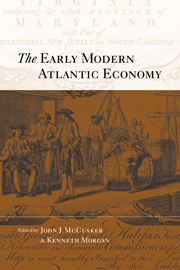Book contents
- Frontmatter
- Contents
- List of figures
- List of tables
- List of abbreviations
- List of contributors
- Dedication
- Introduction
- Part I The role of merchants and their connections
- Part II The development of trades
- 3 Property versus commerce in the mid-eighteenth-century port of London
- 4 Irish businessman and French courtier: the career of Thomas sutton, comte de Clonard, c. 1722–1782
- 5 ‘A revolution in the trade’: wine distribution and the development of the infrastructure of the Atlantic market economy, 1703–1807
- 6 Law, credit, the supply of labour, and the organization of sugar production in the colonial Greater Caribbean: a comparison of Brazil and Barbados in the seventeenth century
- 7 The revolutionary impact of European demand for tropical goods
- 8 The business of distilling in the Old World and the New World during the seventeenth and eighteenth centuries: the rise of a new enterprise and its connection with colonial America
- Part III Imperial economies
- Part IV Colonial working societies
- Index
4 - Irish businessman and French courtier: the career of Thomas sutton, comte de Clonard, c. 1722–1782
from Part II - The development of trades
Published online by Cambridge University Press: 16 October 2009
- Frontmatter
- Contents
- List of figures
- List of tables
- List of abbreviations
- List of contributors
- Dedication
- Introduction
- Part I The role of merchants and their connections
- Part II The development of trades
- 3 Property versus commerce in the mid-eighteenth-century port of London
- 4 Irish businessman and French courtier: the career of Thomas sutton, comte de Clonard, c. 1722–1782
- 5 ‘A revolution in the trade’: wine distribution and the development of the infrastructure of the Atlantic market economy, 1703–1807
- 6 Law, credit, the supply of labour, and the organization of sugar production in the colonial Greater Caribbean: a comparison of Brazil and Barbados in the seventeenth century
- 7 The revolutionary impact of European demand for tropical goods
- 8 The business of distilling in the Old World and the New World during the seventeenth and eighteenth centuries: the rise of a new enterprise and its connection with colonial America
- Part III Imperial economies
- Part IV Colonial working societies
- Index
Summary
Thomas Sutton, comte de Clonard, though his death was lamented in a letter to the foreign minister, Vergennes, by the playwright/brasseur d'affaires Pierre Augustin Caron de Beaumarchais, has long remained in the shadows, variously described as English, Scottish or even Dutch. He was, however, leader of the private interest in the French East India Company which, after the Company's suspension in 1769, organized a successful private trade to the East Indies. Like the English East India Company, the French Company, closely involved in matters of high policy and public finance, had became a battleground for conflict between rival political interests. Sutton also linked trade in the Indian Ocean to slaving voyages from the east coast of Africa (he was, though as a secondary interest, a plantation owner in Saint-Domingue). He had mining interests in Spain, and in wartime engaged in ambitious privateering ventures. In the Seven Years War and afterwards in the ill-fated Guyana (Cayenne) plantation venture, he had close ties with the duke of Choiseul (Etienne-Francois Choiseul), the dominant French politician (variously war minister, navy minister and foreign minister) from 1757 to 1770; and he had ties with all naval ministers, from the 1750s to his death in 1782.
- Type
- Chapter
- Information
- The Early Modern Atlantic Economy , pp. 86 - 104Publisher: Cambridge University PressPrint publication year: 2001



